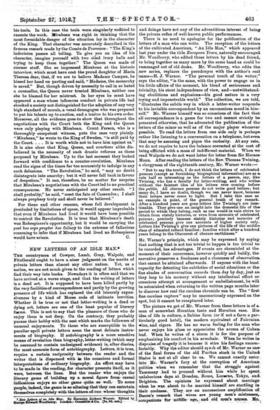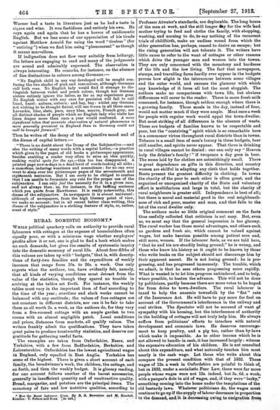NEW LETTERS OF AN IDLE MIN.*
TEEE countrymen of Cowper, Lamb, Gray, Walpole, and FitzGerald ought to have a nicer judgment on the merits of private letters than almost any other. nation. Yet, as a nation, we are not much given -to the reading of letters which find their way into books. Nowadays it is often said that we have arrived at a worse stage, and that the writing of letters is a dead art. It is supposed to have been killed partly by the very facilitieaof correspondence and partly by the growing pressure of life which has replaced the old leisurely expan- eiveness by a kind of Morse code of intimate brevities. Whether it be true or not that letter-writing is a dead or dying art, letters are one of the least popular of literary forms. This is not to say that the pleasure of those who do enjoy them is not deep. On the contrary, they probably pursue their hobby with the zest which marks the followers of unusual enjoyments. To those who are susceptible to the peculiar spell private letters seem the most delicate instru- ments of biography. If autobiography is a more sensitive tneans of revelation than biography, letter-writing (which may be assumed to contain undesigned evidence) is, after diaries, the most accurate form of autobiography. Letters, itis true, require a certain reciprocity between the reader and the writer that is dispensed with in the conscious and formal interpretations of ordinary biography. An effort may have to be made in the reading, for character presents itself, as it were, between the lines. But the reader who enjoys the literary game of building up a moral figure from casual- indications enjoys no other game quite so well.- To some people, indeed, the game is so alluring that they can entertain themselves completely with the letters.of one whose thoughts "New Letters of an /die MM. By. lierraaan 4acksou Warner. Edited by George Edward Woodberxi. Loedoni Coostalhe-aVu. Ps. 6d. nat.].
and doings have not any of the adventitious interest of being the private reflex of well-known public performances.
There is no need to apologize for the publication of the letters of a man who can write. The reception of the letters of the cultivated American, "Au Idle Man," which appeared last year under the title European Years, naturally encouraged Mr. Woodberry, who edited those letters by his dead friend,
to bring together as many more by the same hand as could be- rummaged out of old desks. Mr. Woodberry, who edits the new series, replaces the pseudonym with the author's real 'nanier-.11.. J. Warner. "The personal touch of the writer," .says the editer, "is the same, with the power to engage us in his little affairs of the moment, his blend of seriousness and triviality, his stout independence of view, and—notwithstand- ing ebullitions and explosions—his good nature in a very trying and impenetrable world." The collection, we are told, "illustrates the subtle way in which a letter-writer responds to his invisible correspondent by an unconscious mood in him- self." Mr. Warner himself was so conscious of the fact that. all correspondence is a game for two and cannot strictly be presented otherwise, that he advocated the publication of the letters of the minor as well as of the major player whenever
possible. To read the letters from one side only is perhaps rather like listening to a conversation on a telephone, but even that may be amusing and pique the curiosity. At any rate, we do not require to have the balance corrected at the cost of- being afflicted with a mass of indifferent material. When we read Walpole we do not want letter for letter from Sir Horace Mann. After reading the letters of the Rev. Thomas Twining, a clergyman of the eighteenth century, Mr. Warner wrote:— , "But to say the truth, I do not think the letters of celebrated:. persons (except as furnishing biographical information) are as a. rule half as interesting as the letters of a person, say, like 'Twining, who has a faculty for letter-writin and who writes without the faintest idea of his letters ever coming before the public. All obscure persons do not write good letters; but many do, I have no doubt, though we can never know, because their letters never come to light. But I take this case as an example in point, of the general truth of my remark. After a hundred years are gone letters like Twining's are ines- timable. They give one an insight into the domestic life of the period to which they belong, such as one would in vain strive to. obtain from stately histories or even from memoirs ef celebrated persons ; precisely because!. stately _histories and memoirs of celebrated persons give one accounts of higher society only. Letters like twining's give one pictures of the life of the middle class of educated.refined families : families which after a hundred. years belong to the Obscurest of obscure earthliness."
Mr. Warner's principle, which may be expressed by saying that nothing that is not too trivial to happen is too trivial to. be recorded, has advantages. If events are chronicled at the- moment of their occurrence, however quickly and baldly, the narrative preserves a freshness and a closeness of observation._ that cannot be attained afterwards. If anyone with.the least
capacity for detecting the subtleties of social situations or the fine shades of conversation records them day by day, just as they leap to his memory without any intellectual effort or_ conscious attempt at arrangement or embellishment, be wifl be astonished when returning to the written page months later.
to discover how real the careless chronicle can be. The "first. fine careless rapture" may be unconsciously expressed on the spot, but it cannot be recaptured later.
The pieture we get of Mr. Warner from these letters is of a- men of somewhat Horatian taste and Horatian ease. His.
idea of life is culture, a Sabine farm (or if not a farm a par- ticularly good hotel), the modern equivalent of Falernian wine, and cigars. He has no warm feeling for the man who. never enjoys his glass or appreciates the aroma of Cuban.
leaf. When he writes of a storm it is for the purpose of emphasizing his comfort in his armchair. When he writes in dispraise-of tragedy it is because it stirs his feelings uncom- fortably. Why the editor should spear of Mr. Warner- as one- of the final forms of the old Puritan stock in the United States is not -at all clear to us. We cannot exactly enter.
into Mr. Warner's fury. at the corruption of American polities when we remember that the struggle against Tammany .had to Proceed without him while he spent, unlaborious days at Dresden, Rome, Lucerne, Tokyo, and. Brighton. The opinions he expressed about marriage
when be wee about to be married himself are startling in their coolnees.. They are an unconscious amplification of. Bacon's remark that wives- are young men's mistresses„
.cornpanions fro' middleS age, and old men's nurses. Mr._
Warner had a taste in literature just as he had a taste in cigars and wine. It was fastidious and entirely his own. He says again and again that he has a horror of unidiomatic English. But we lose some of our appreciation of his tirade against Matthew Arnold for using the word " tireless " (for "untiring ") when we find him using "phenomenal" as though it meant marvellous.
If indignation does not flow very suitably from lethargy, the letters are engaging to read and many of the judgments are sound and admirably expressed. The observation is always interesting. He remarks, for instance, on the absence Of fine distinctions in colours among Germans :—
"No English child in any way developed will be caught con- fusing the two shades of pink and rose-colour, although Germans call both rosa. No English lady would find it strange to dis- tinguish between violet and peach colour, though her German sisters entirely ignore the latter, as far as my experience goes. No English writer with any care for precision will fail to call hazel, hazel: auburn, auburn: and bay, bay : whilst any German not wishing to be thought finical, will use brown in all three cases. Lavender, lilac, slate, puce, navy blue, mauve, French grey, are all distinct shades of purple which no English lady who visits her linen draper more than once a year would confound. A more significant token that accurate observation of natural phenomena is ?sore generally prevalent in England than in Germany could not teen be brought forward."
Then he writes of the decay of the subjunctive mood and of the disuse of capital letters :—
"There is no doubt about the Decay of the Subjunctive :—and also the writing of many words with a capital Letter,—a practice which gives to the pages of old books a picturesque appearance, besides enabling a reader very often to seize an idea quickly, making restful spots for the eye,—this too has disappeared. A printed page now-a-days is a dead level of words looking all alike ; a monotnne, inducing weariness and somnolence : for no one ever went to sleep over the picturesque pages of the seventeenth and eighteenth centuries. But I am sorry to be obliged to confess that I am unable to formulate any rule for the proper use of the subjunctive. I can only feel the necessity for it in a given case, and not always then: as, for instance, in the baffling sentence which you quote from Hawthorne. It is really noteworthy, this disuse of the subjunctive. In newspapers it is almost universal: although of newspapers, from the high literary point of view, Nye make no account : but in all recent better class writing, this disuse of the subjunctive is a striking feature of style, or, rather, want of style."











































 Previous page
Previous page